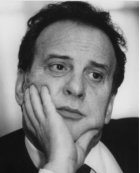
Taking Sides Page #9
- NOT RATED
- Year:
- 2001
- 108 min
- 526 Views
FURTWÄNGLER
I received a telegram from Hermann
Goering informing me that he had
made me a Privy Councillor. I was
not given the opportunity either
to accept or refuse. After the
dreadful events of November 1938,
the violent attacks on the Jews, I
stopped using the title.
STEVE:
What about Vice-President of the
Chamber of Music, you used that
title didn't you? But then I suppose
you had no choice there either,
because I suppose Dr. Goebbels
just sent you a telegram saying,
Dear Mr. Vice-President.
FURTWÄNGLER
I don't think Dr. Goebbels sent me
a telegram. I was simply told. In
a letter, I believe. I don't
remember exactly.
STEVE:
Goebbels and Goering were sure
heaping honours on you. One makes
you a Privy Councillor, the other
makes you Vice-President of the
Chamber of Music, and you weren't
even a member of the Party, how do
you explain that?
FURTWÄNGLER
Well, there was a constant battle
between Goering and Goebbels as to
which of them would control German
culture. I was simply a pawn.
Anyway, I resigned from the
Musikkammer at the same time I
resigned as Musical Director of
the Berlin Philharmonic Orchestra.
In 1934.
David puts up a hand. Steve nods.
DAVID:
Why was that? Why did you resign,
Dr. Furtwängler?
FURTWÄNGLER
I wrote an open letter to the
newspapers condemning what they
were doing to music, making these
distinctions between Jews and non-
Jews. For my part, the only divide
in art is between good and bad.
Eventually, Goebbels summoned me
and told me I could leave the
country if I wanted to but under
no condition would I ever be allowed
to return. I always believe that
you have to fight from the inside
not from without. I asked myself,
what's the duty of an artist, to
stay or to leave? And then Goebbels
demanded that I acknowledge Hitler
as solely responsible for cultural
policy. Well, that was a fact and
it seemed pointless to deny it. I
simply acknowledged that Hitler
and the Minister of Culture
appointed by him were solely
responsible for the cultural policy
of the Reich. What I wanted to
express was that I, personally,
had no responsibility whatsoever
for their cultural policy. I have
always had the view that art and
politics should... should have
nothing to do with each other.
STEVE:
Then why did you conduct at one of
their Nuremberg rallies?
FURTWÄNGLER
(flaring)
I did not conduct at at the rally,
I conducted on the evening before
the rally.
STEVE:
That sounds like the small print
in one of our insurance policies,
Wilhelm. And what about April 19,
1942? The eve of Hitler's fifty-
third birthday, the big celebration;
you conducted for Hitler, didn't
you? Was that in keeping with your
view that art and politics have
nothing to do with each other?
FURTWÄNGLER
(flustered)
That... that was a different matter,
I... I was tricked.
STEVE:
How come?
FURTWÄNGLER
Could I have a glass of water,
please? Please, Fraulein?
EMMI:
Straube.
Steve looks expectant but Furtwängler remains silent. Steve
nods to Emmi, who gets the water. Furtwängler drinks.
Steve waits.
FURTWÄANGLER
Thank you. I was in Vienna,
rehearsing the Ninth Symphony of
Beethoven, when Goebbels called
and said I had to conduct at
Hitler's birthday. I'd always
managed to wriggle out of such
invitations, pleading previous
engagements, illness, having my
doctors state I was not well and
so on and so on. I was also
fortunate that Baldur von Shirach,
who controlled Vienna, hated Dr.
Goebbels and would do anything to
thwart his wishes. But this time
Goebbels got to my doctors before
me; they were frightened off, and
von Schirach was threatened, bullied
and gave in. So, I had no
alternative but to conduct for
Hitler. Believe me, I knew I had
compromised, and I deeply regret
it.
Translation
Translate and read this script in other languages:
Select another language:
- - Select -
- 简体中文 (Chinese - Simplified)
- 繁體中文 (Chinese - Traditional)
- Español (Spanish)
- Esperanto (Esperanto)
- 日本語 (Japanese)
- Português (Portuguese)
- Deutsch (German)
- العربية (Arabic)
- Français (French)
- Русский (Russian)
- ಕನ್ನಡ (Kannada)
- 한국어 (Korean)
- עברית (Hebrew)
- Gaeilge (Irish)
- Українська (Ukrainian)
- اردو (Urdu)
- Magyar (Hungarian)
- मानक हिन्दी (Hindi)
- Indonesia (Indonesian)
- Italiano (Italian)
- தமிழ் (Tamil)
- Türkçe (Turkish)
- తెలుగు (Telugu)
- ภาษาไทย (Thai)
- Tiếng Việt (Vietnamese)
- Čeština (Czech)
- Polski (Polish)
- Bahasa Indonesia (Indonesian)
- Românește (Romanian)
- Nederlands (Dutch)
- Ελληνικά (Greek)
- Latinum (Latin)
- Svenska (Swedish)
- Dansk (Danish)
- Suomi (Finnish)
- فارسی (Persian)
- ייִדיש (Yiddish)
- հայերեն (Armenian)
- Norsk (Norwegian)
- English (English)
Citation
Use the citation below to add this screenplay to your bibliography:
Style:MLAChicagoAPA
"Taking Sides" Scripts.com. STANDS4 LLC, 2024. Web. 23 Dec. 2024. <https://www.scripts.com/script/taking_sides_403>.



Discuss this script with the community:
Report Comment
We're doing our best to make sure our content is useful, accurate and safe.
If by any chance you spot an inappropriate comment while navigating through our website please use this form to let us know, and we'll take care of it shortly.
Attachment
You need to be logged in to favorite.
Log In